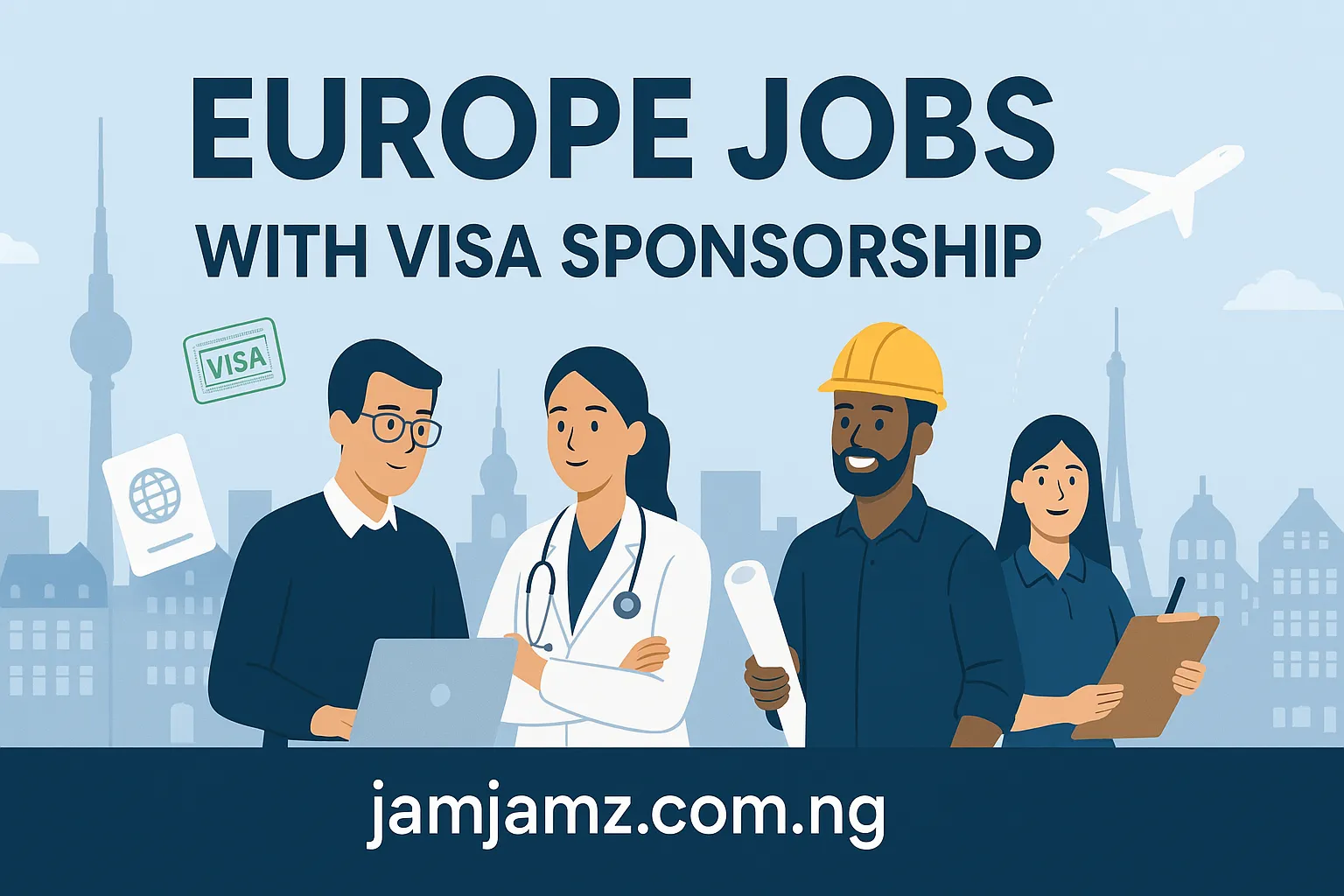Looking for Europe jobs with visa sponsorship in 2025? Discover the top countries, job sectors, requirements, and by step guide to securing sponsored employment abroad.
Basic Information
| Category | Details |
|---|---|
| Who Can Apply | Skilled & unskilled workers (IT, health care, construction, hospitality, logistics) |
| Top Countries Offering Sponsorship | Germany, Netherlands, Ireland, Sweden, Poland, France |
| Visa Types | EU Blue Card, Work Permit, Temporary Work Visa |
| Requirements | Valid passport, CV/Resume, Job Offer Letter, Educational Certificates |
| Application Channels | Official job portals, embassy sites, recruitment agencies |
Why Consider Europe Jobs with Visa Sponsorship?
Europe offers diverse job opportunities, competitive salaries, and excellent living standards. Many countries face skill shortages, making them open to hiring foreign workers with visa sponsorship.
Popular Countries
1. Germany
Known for its EU Blue Card program, Germany is in high demand for IT experts, engineers, and health professionals.
2. Netherlands
The Dutch government sponsors skilled migrants through the Highly Skilled Migrant Program, ideal for tech and finance workers.
3. Ireland
With its growing economy, Ireland offers Critical Skills Employment Permits for professionals in healthcare, construction, and IT.
4. Sweden
Sweden allows visa sponsorship for skilled jobs in engineering, teaching, and nursing.
5. Poland
Poland’s developing industries create opportunities for both skilled and unskilled workers, especially in logistics, agriculture, and manufacturing.
6. France
France sponsors work visas for skilled professionals in education, research, and tech industries.
High Demand
-
Healthcare nurses, doctors, caregivers
-
Information Technology software developers, cybersecurity experts, AI specialists
-
Engineering civil, electrical, and mechanical engineers
-
Construction & Logistics truck drivers, builders, machine operators
-
Hospitality & Services chefs, cleaners, housekeepers
Guide to Apply
-
Choose Your Target Country Research countries that align with your profession.
-
Prepare Your CV & Documents Use an international format CV and include references.
-
Search Verified Job Portals Examples: EURES (EU Job Portal), Indeed, LinkedIn.
-
Apply for Jobs Offering Sponsorship Check job descriptions for “visa sponsorship available.”
-
Secure a Job Offer Letter This is essential for your visa application.
-
Apply for a Work Visa Submit your application via the respective embassy or consulate.
-
Relocate & Start Work approved, you can legally live and work in Europe.
Contact Details
| Resource | Website |
|---|---|
| EU Job Portal (EURES) | eures.europa.eu |
| German EU Blue Card | make-it-in-germany.com |
| Netherlands IND (Immigration Service) | ind.nl |
| Irish Work Permits | enterprise.gov.ie |
| Swedish Migration Agency | migrationsverket.se |
Tips
-
Learn basic local language skills (German, French, Polish, etc.).
-
Target shortage occupations for higher approval rates.
-
Avoid scams apply only through official portals.
-
Prepare for interviews highlighting skills relevant to the employer.
Final Thoughts
Europe jobs with visa sponsorship are a gateway to a better future for skilled and unskilled workers. With the right preparation, official applications, and persistence, you can secure your dream job abroad.
FAQ’s
1. What are Europe jobs with visa sponsorship?
These are jobs offered by European employers who provide legal work visas for foreign employees, allowing them to live and work in Europe.
2. Which European countries offer visa sponsorship the easiest?
Countries like Germany, Netherlands, Ireland, Sweden, Poland, and France are known for sponsoring skilled and semi-skilled workers. Europe Jobs
3. Do I need a degree to get a sponsored job in Europe?
Not always. Skilled professions (IT, engineering, healthcare) usually require a degree, but unskilled jobs (hospitality, logistics, domestic work) may not.
4. How can I find Europe jobs with visa sponsorship?
Use verified platforms such as:
-
EURES EU Job Portal
-
LinkedIn
-
Indeed Europe
-
Official recruitment agencies or embassy
5. Do I need to speak the local language?
It depends on the country and job sector. While English is widely accepted in IT, finance, and international companies, basic knowledge of the local language is helpful for healthcare, hospitality, and service roles.
6. How long does it take to get a work visa sponsored in Europe?
Processing times vary by country and job type, but typically range from 1 to 6 months after receiving a valid job offer.
7. Can my family join me if I get a sponsored job in Europe?
Yes, many European countries allow dependents (spouse and children) to join the sponsored worker, but visa rules differ by country. Europe Jobs
8. Are there scams I should watch out for?
Yes. Avoid offers that ask for upfront payments or personal financial information. Always apply through official portals or verified employers. Europe Jobs
